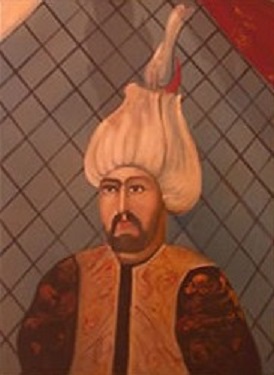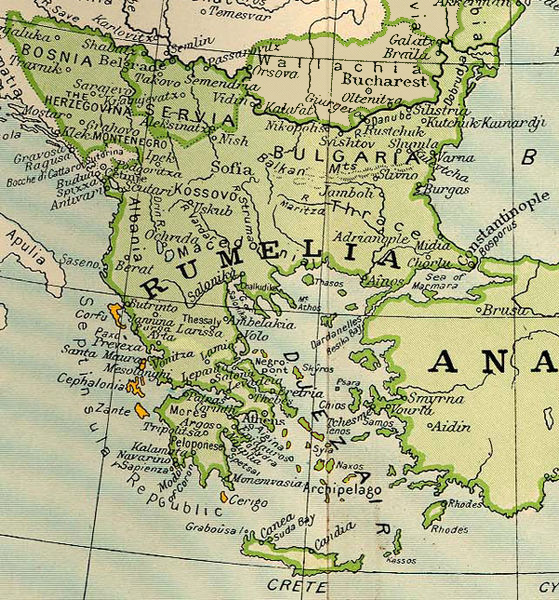|
Mehmed-paša Sokolović
Sokollu Mehmed Pasha ( ota, صوقوللى محمد پاشا, Ṣoḳollu Meḥmed Pașa, tr, Sokollu Mehmet Paşa; ; ; 1506 – 11 October 1579) was an Ottoman statesman most notable for being the Grand Vizier of the Ottoman Empire. Born in Ottoman Herzegovina into an Orthodox Christian Serbian family, Mehmed was abducted at an early age as part of the Ottoman devşirme system of forcibly recruiting Christian boys to be raised to serve as a janissary. He rose through the ranks of the Ottoman imperial system, eventually holding positions as commander of the imperial guard (1543–1546), High Admiral of the Fleet (1546–1551), Governor-General of Rumelia (1551–1555), Third Vizier (1555–1561), Second Vizier (1561–1565), and as Grand Vizier (1565–1579, for a total of 14 years, three months, 17 days) under three sultans: Suleiman the Magnificent, Selim II, and Murad III.Imamović, Mustafa (1996). Historija Bošnjaka. Sarajevo: BZK Preporod. He was assassinated in 1579, ... [...More Info...] [...Related Items...] OR: [Wikipedia] [Google] [Baidu] |
Pasha
Pasha, Pacha or Paşa ( ota, پاشا; tr, paşa; sq, Pashë; ar, باشا), in older works sometimes anglicized as bashaw, was a higher rank in the Ottoman Empire, Ottoman political and military system, typically granted to governors, generals, dignitary, dignitaries, and others. As an honorific, honorary title, ''Pasha'', in one of its various ranks, is similar to a British Peerage of the United Kingdom, peerage or knighthood, and was also one of the highest titles in the 20th-century Kingdom of Egypt. The title was also used in Morocco in the 20th century, where it denoted a regional official or governor of a district. Etymology The English word "pasha" comes from Turkish language, Turkish ('; also ()). The Oxford Dictionaries (website), Oxford Dictionaries attributes the origin of the English borrowing to the mid-17th century. The etymology of the Turkish word itself has been a matter of debate. Contrary to titles like emir (''amīr'') and bey (''beg''), which were es ... [...More Info...] [...Related Items...] OR: [Wikipedia] [Google] [Baidu] |
Enderun School
The Enderun School ( ota, اندرون مکتب, Enderûn Mektebi) was a palace school and boarding school within Topkapi Palace. It was mostly for Princes of the court and the Janissaries of the Ottoman Empire. Students here were primarily recruited via ''devşirme'', a system of the Islamization of Christian slave children for serving the Ottoman government in bureaucratic, managerial, and Janissary military positions.Kemal H Karpat "Social Change and Politics in Turkey: A Structural-Historical Analysis" page 204 Over the centuries, the Enderun School was fairly successful in generating Ottoman statesmen by drawing among the empire's various ethnic groups and giving them a common Muslim education. The school was run by the "Inner Service" (''Enderûn'') of the Ottoman palace and had both academic and military purposes. The graduates were expected to devote themselves to government service and be free of links to lower social groups. The Enderun School's gifted education program ... [...More Info...] [...Related Items...] OR: [Wikipedia] [Google] [Baidu] |
Devşirme
Devshirme ( ota, دوشیرمه, devşirme, collecting, usually translated as "child levy"; hy, Մանկահավաք, Mankahavak′. or "blood tax"; hbs-Latn-Cyrl, Danak u krvi, Данак у крви, mk, Данок во крв, Danok vo krv, bg, Кръвен данък, Kraven Danak.) was the Ottoman practice of forcibly recruiting soldiers and bureaucrats from among the children of their Balkan Christian subjects. Those coming from the Balkans came primarily from noble Balkan families and rayah classes. It is first mentioned in written records in 1438, but probably started earlier. It created a faction of soldiers and officials loyal to the Sultan. It counterbalanced the Turkish nobility, who sometimes opposed the Sultan. The system produced a considerable number of grand viziers from the 1400s to the 1600s. This was the second most powerful position in the Ottoman Empire, after the sultan. Initially, the grand viziers were exclusively of Turk origin, but after there wer ... [...More Info...] [...Related Items...] OR: [Wikipedia] [Google] [Baidu] |
Serbs
The Serbs ( sr-Cyr, Срби, Srbi, ) are the most numerous South Slavic ethnic group native to the Balkans in Southeastern Europe, who share a common Serbian ancestry, culture, history and language. The majority of Serbs live in their nation state of Serbia, as well as in Bosnia and Herzegovina, Croatia, Montenegro, and Kosovo. They also form significant minorities in North Macedonia and Slovenia. There is a large Serb diaspora in Western Europe, and outside Europe and there are significant communities in North America and Australia. The Serbs share many cultural traits with the rest of the peoples of Southeast Europe. They are predominantly Eastern Orthodox Christians by religion. The Serbian language (a standardized version of Serbo-Croatian) is official in Serbia, co-official in Kosovo and Bosnia and Herzegovina, and is spoken by the plurality in Montenegro. Ethnology The identity of Serbs is rooted in Eastern Orthodoxy and traditions. In the 19th century, the Serbia ... [...More Info...] [...Related Items...] OR: [Wikipedia] [Google] [Baidu] |
Russo-Crimean War (1571)
The Russo-Crimean Wars were fought between the forces of the Tsardom of Russia and the Crimean Khanate during the 16th century over the region around the Volga River. In the 16th century, the Wild Steppes in Russia were exposed to the Khanate. During the wars, the Crimean Khanate (supported by the Turkish army) invaded central Russia, devastated Ryazan, and burned Moscow. However, the next year they were defeated in the Battle of Molodi. Despite the defeat, the raids continued. As a result, the Crimean Khanate was invaded several times, conquered in the late 18th century. The Tatars eventually lost their influence in the regions. The raids began shortly after the establishment of the Russian buffer state, Qasim Khanate, and the domination of Russia in the Russo-Kazan Wars of the late 15th century. History The Crimean invasions of Russia began in 1507, after the death of Moscow's grand duke Ivan III, with the Crimean Khanate attacking the Russian towns of Belev and Kozels ... [...More Info...] [...Related Items...] OR: [Wikipedia] [Google] [Baidu] |
Ottoman–Hungarian Wars
The Ottoman–Hungarian Wars were a series of battles between the Ottoman Empire and the medieval Kingdom of Hungary. Following the Byzantine Civil War, the Ottoman capture of Gallipoli, and the decisive Battle of Kosovo, the Ottoman Empire was poised to conquer the entirety of the Balkans and also sought and expressed desire to expand further north into Central Europe beginning with the Hungarian lands. Initial Hungarian success culminated in the Crusade of Varna, though without significant outside support the Hungarians were defeated. Nonetheless the Ottomans suffered more defeats at Belgrade, even after the conquest of Constantinople. In particular, the notorious Vlad the Impaler, with limited Hungarian help, resisted Ottoman rule until the Ottomans placed his brother, a man less feared and less hated by the populace, on the throne of Wallachia. Ottoman success was once again halted at Moldavia due to Hungarian intervention, but the Turks finally succeeded when Moldavia and ... [...More Info...] [...Related Items...] OR: [Wikipedia] [Google] [Baidu] |
Vizier
A vizier (; ar, وزير, wazīr; fa, وزیر, vazīr), or wazir, is a high-ranking political advisor or minister in the near east. The Abbasid caliphs gave the title ''wazir'' to a minister formerly called ''katib'' (secretary), who was at first merely a helper but afterwards became the representative and successor of the ''dapir'' (official scribe or secretary) of the Sassanian kings. In modern usage, the term has been used for government ministers in much of the Middle East and beyond. Several alternative spellings are used in English, such as ''vizir'', ''wazir'', and ''vezir''. Etymology Vizier is suggested to be an Iranian word, from the Pahlavi root of ''vičir'', which originally had the meaning of a ''decree'', ''mandate'', and ''command'', but later as its use in Dinkard also suggests, came to mean ''judge'' or ''magistrate''. Arthur Jeffery considers the word to be a "good Iranian" word, as has a well-established root in Avestan language. The Pahlavi ''viči ... [...More Info...] [...Related Items...] OR: [Wikipedia] [Google] [Baidu] |
Rumelia
Rumelia ( ota, روم ايلى, Rum İli; tr, Rumeli; el, Ρωμυλία), etymologically "Land of the Names of the Greeks#Romans (Ῥωμαῖοι), Romans", at the time meaning Eastern Orthodox Christians and more specifically Christians from the Byzantine Rite, Byzantine rite, was the name of a historical region in Southeastern Europe that was administered by the Ottoman Empire, corresponding to the Balkans. In its wider sense, it was used to refer to all Ottoman possessions and Vassal state, vassals in Europe that would later be geopolitically classified as "the Balkans". During the period of its existence, it was more often known in English as Ottoman Empire, Turkey in Europe. Etymology ''Rûm'' in this context means "Greek", or a Christian Greek speaker and ''ėli'' means "land" and ''Rumelia'' ( ota, روم ايلى, ''Rūm-ėli''; Turkish language, Turkish: ''Rumeli'') means "Land of the Romans" in Ottoman Turkish language, Ottoman Turkish. It refers to the lands co ... [...More Info...] [...Related Items...] OR: [Wikipedia] [Google] [Baidu] |




